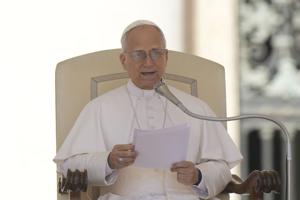Pope Leo XIV recently delivered a poignant appeal for a renewed global commitment to diplomacy as he commemorated the 50th anniversary of the Helsinki Accords. Speaking from the Vatican, His Holiness underscored the enduring relevance of the landmark agreement, urging nations to prioritize dialogue and cooperation in resolving contemporary conflicts.
The Helsinki Accords, signed on August 1, 1975, represented a pivotal moment during the Cold War era. This historic agreement brought together 35 nations, including the United States and the Soviet Union, establishing foundational principles for security and human rights across Europe, aiming to foster greater stability and mutual understanding amidst geopolitical tensions.
At the conclusion of his weekly general audience, the first American pontiff emphasized that the “spirit of Helsinki” remains vital in today’s complex world. Pope Leo XIV passionately reiterated his consistent calls for peace, stating the imperative to “persevere in dialogue, strengthen cooperation and make diplomacy the preferred way to prevent and resolve conflicts,” highlighting a path towards harmonious international relations.
The original signing of the Helsinki Final Act occurred at the height of Cold War détente, hosted by Finnish President Urho Kekkonen. Dignitaries such as U.S. President Gerald Ford and Soviet leader Leonid Brezhnev affixed their signatures to a document that enshrined commitments to peace, facilitated East-West contacts, and addressed European security concerns alongside the critical issue of human rights.
Pope Leo XIV articulated that the agreement “inaugurated a new geopolitical season,” successfully fostering a rapprochement between the Eastern and Western blocs. Crucially, the accords also marked a significant resurgence of interest in fundamental human rights, with particular attention dedicated to religious freedom, which was recognized as a cornerstone of the emerging framework for international cooperation spanning from Vancouver to Vladivostok.
This half-century milestone of the Helsinki Final Act also indirectly contributed to the eventual establishment of the Organization for Security and Cooperation in Europe (OSCE). This organization continues to serve as a vital platform for political dialogue on peace and security issues, building upon the original principles laid out in the 1975 agreement and promoting stability across the continent.
Wednesday’s general audience, during which Pope Leo XIV delivered his significant address, marked his return to weekly encounters with the faithful after a summer recess. St. Peter’s Square was notably filled, with tens of thousands of pilgrims arriving in Vatican City for a weeklong series of events, reflecting the widespread interest in the pontiff’s pronouncements on global affairs and peace initiatives.
The enduring message of the Helsinki Accords, as highlighted by Pope Leo XIV, serves as a powerful reminder of the potential for international cooperation to overcome division and address pressing global challenges. Its principles continue to inspire efforts towards fostering trust and ensuring respect for human dignity worldwide, reinforcing the critical role of diplomacy in shaping a more peaceful future.






Leave a Reply